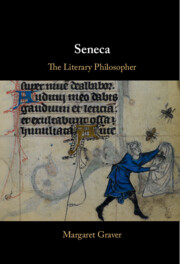
-
Select format
-
- Publisher:
- Cambridge University Press
- Publication date:
- 23 March 2023
- 30 March 2023
- ISBN:
- 9781316683125
- 9781107164048
- Dimensions:
- (229 x 152 mm)
- Weight & Pages:
- 0.629kg, 318 Pages
- Dimensions:
- Weight & Pages:
You may already have access via personal or institutional login
Book description
Seneca stands apart from other philosophers of Greece and Rome not only for his interest in practical ethics, but also for the beauty and liveliness of his writing. These twelve in-depth essays take up a series of interrelated topics in his works, from his relation to Stoicism, Epicureanism, and other schools of thought; to the psychology of emotion and action and the management of anger and grief; to letter-writing, gift-giving, friendship, and kindness; to Seneca's innovative use of genre, style, and humor. Recalling Socrates's critique of philosophical writing in Plato's Phaedrus, this volume gives particular attention to Seneca's ideas about the techniques of reading, writing, and study that make philosophy beneficial to the individual and to society. Clear explanations and careful translations make the volume accessible to a wide range of readers.
Reviews
‘In looking over the essays as a whole, I am struck by the wide variety of interests and themes that Graver has tackled over the last three decades. Her observations and analysis are always clear and sharp, and I felt that I gained a further appreciation of the nuances of Seneca’s moral psychology and Stoic sympathies in reading these pieces. It was also interesting to observe how, for example, a mention of gaudium in an early essay resonates in later pieces, or how in certain essays Graver brings her encyclopedic knowledge of broader Greek and Roman philosophy to bear.’
Christopher Trinacty Source: Bryn Mawr Classical Review
Contents
Metrics
Altmetric attention score
Full text views
Full text views help Loading metrics...
Loading metrics...
* Views captured on Cambridge Core between #date#. This data will be updated every 24 hours.
Usage data cannot currently be displayed.
Accessibility standard: Unknown
Why this information is here
This section outlines the accessibility features of this content - including support for screen readers, full keyboard navigation and high-contrast display options. This may not be relevant for you.
Accessibility Information
Accessibility compliance for the PDF of this book is currently unknown and may be updated in the future.


